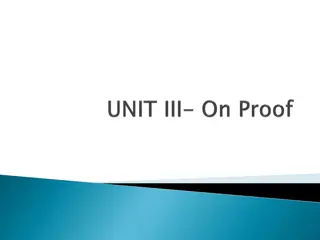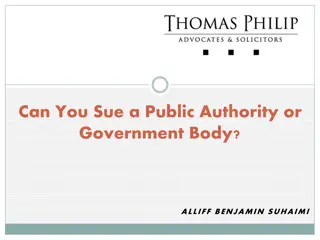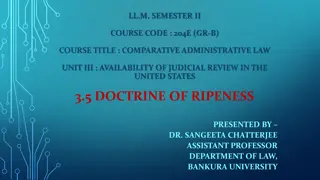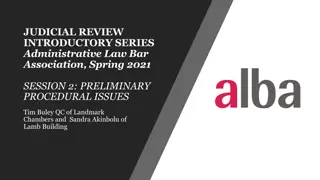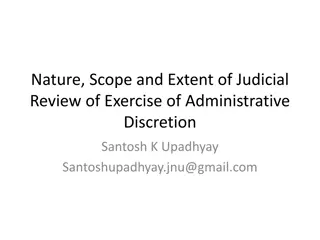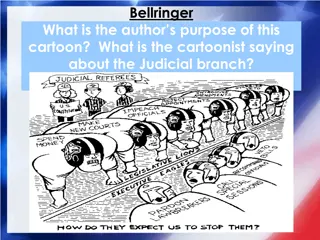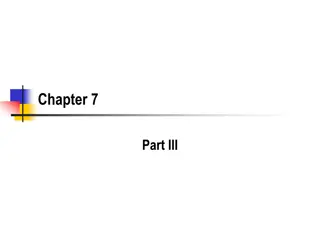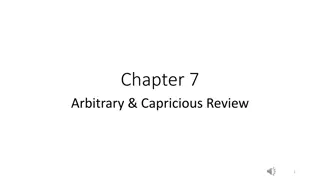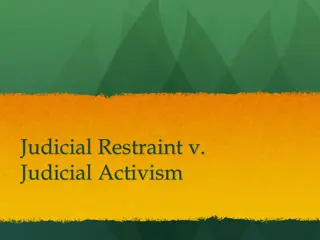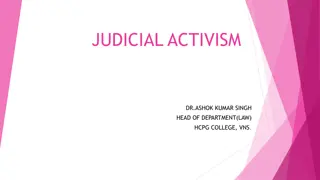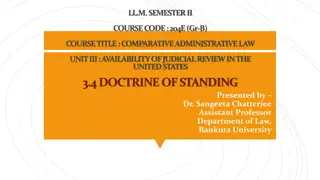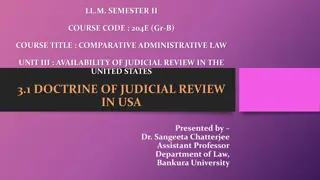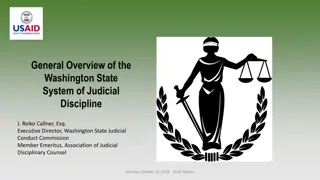Understanding Judicial Review of Agency Facts
Judicial review of agency facts involves Congress setting the scope of review within constitutional boundaries, allowing anything from trial de novo to no review. Different standards such as Trial De Novo, Independent Judgment on the Evidence, Clearly Erroneous, Substantial Evidence, and Universal Camera v. NLRB are used to determine the validity of agency findings. The process involves assessing if the agency's decision is reasonable and supported by adequate evidence, ensuring accountability and fairness in administrative proceedings.
Download Presentation

Please find below an Image/Link to download the presentation.
The content on the website is provided AS IS for your information and personal use only. It may not be sold, licensed, or shared on other websites without obtaining consent from the author. Download presentation by click this link. If you encounter any issues during the download, it is possible that the publisher has removed the file from their server.
E N D
Presentation Transcript
Chapter 7 Judicial Review of Facts Determined by the Agency
Scope of Judicial Review of Facts Congress sets scope of review, within constitutional boundaries. Since the Constitution is silent on agencies, Congress has a pretty free hand. Congress can allow anything from a trial de novo to no review, unless such an action otherwise runs afoul of the constitution. 2
Trial De Novo You start over at the trial court Agency findings can be used as evidence, but there is no deference to the agency FOIA Used more by the states than the feds 3
Independent Judgment on the Evidence Decide on the agency record, but do not defer to the agency's interpretation of the record. 4
Clearly Erroneous Definite and firm conviction that a mistake has been made on the facts or policy Same as reviewing a verdict by a trial judge without a jury 5
Substantial Evidence - Formal Adjudications 706(2)(E) - only applies to formal adjudications and formal rulemaking Could a reasonable person have reached the same conclusion? Standard for reviewing a jury verdict or for taking a case from the jury Should a jury get more or less deference than an agency? Hint - substantial means some, not a lot, when you are the agency 6
Substantial Evidence - Informal Adjudications and Rulemaking 706(2)(A) Arbitrary and capricious or abuse of discretion Same assessment of reasonableness as 706(2)(E), so the result is about the same as the substantial evidence test used for formal proceedings This is the most common standard 7
Substantial Evidence - Universal Camera v. NLRB, 340 US 474 (1951) it is such relevant evidence as a reasonable mind might accept as adequate to support a conclusion ; it is evidence sufficient to withstand a motion for a directed verdict. It is a less rigorous standard than clearly erroneous, the standard by which appellate courts review factual findings made by a trial judge. It is more rigorous than no basis in fact. The agency s findings are entitled to respect, but they must nonetheless be set aside when the record before a [court] clearly precludes the [agency s] decision from being justified by a fair estimate of the worth of the testimony of witnesses or its informed judgment on matters within its special competence or both. . . . 8
Some Evidence Scintilla test The agency needs to show even less than in the substantial evidence standard Only limited use 9
Facts Not Reviewable At All Congress can prevent certain types of judicial review Compensation decisions under the Smallpox Vaccine Compensation Act are not reviewable Enabling law is always reviewable unless Congress has taken away the court's subject matter jurisdiction. 10
What if the Court thinks the Agency's Policy Choice is Wrong? Should the court defer to findings which it believes are clearly erroneous, but are supported by substantial evidence? Why is this consistent with the political control of agencies? When the legislature gives the agency the power, it is also saying that it only wants agency decisions overturned in the most serious cases Courts have different political views than agencies and thus they should be esp. careful about reversing agency decisions. 11
Agency/ALJ Conflicts/Outside LA Assume there is a hearing before an ALJ, the ALJ prepares a recommended opinion, and the agency wants to overrule the ALJ. May the agency substitute its decision for that of the ALJ? Why is the agency in a different position than the court when reconsidering an ALJ decision? What must the agency do when it wants to overrule an ALJ? 12
ALJ Expertise Which ALJ decisions are entitled to the most deference? Can the agency really reevaluate witness credibility decisions by the ALJ? What ALJ decisions are entitled to the least deference? In the firing of the union organizer caught smoking, why would evidence of an anti-smoking policy and enforcement reduce the deference to the ALJ s determination of credibility of the witnesses? 13
OLeary v. Brown-Pacific-Maxon, 340 U.S. 504 (1951) Was a worker within course and scope of employment when he drowned trying to save a foundering swimmer? Were there any disputed facts? Is this a legal question, entitled to less deference, or a factual one, entitled to more deference? 14
Frankfurters Hybrid Decision Analysis [This] only serves to illustrate once more the variety of ascertainments covered by the blanket term fact. Here of course it does not connote a simple, external, physical event as to which there is conflicting testimony. The conclusion concerns a combination of happenings and the inferences drawn from them. In part at least, the inferences presuppose applicable standards for assessing the simple, external facts. Yet the standards are not so severable from the experience of industry nor of such a nature as to be peculiarly appropriate for independent judicial ascertainment as questions of law. 15
NLRB v. Bell Aerospace Co., 416 U.S. 267 (1974) Company refuses to collectively bargain with buyers, saying they are managers. Agency finds that only managers whose interests align with the company are exempted from unionization. The court overruled the agency, holding that the law exempted all managers. Why no substantial evidence review and Hearst/ Chevron deference? How might the agency still get deference on the remand to determine whether buyers are managers? 16




